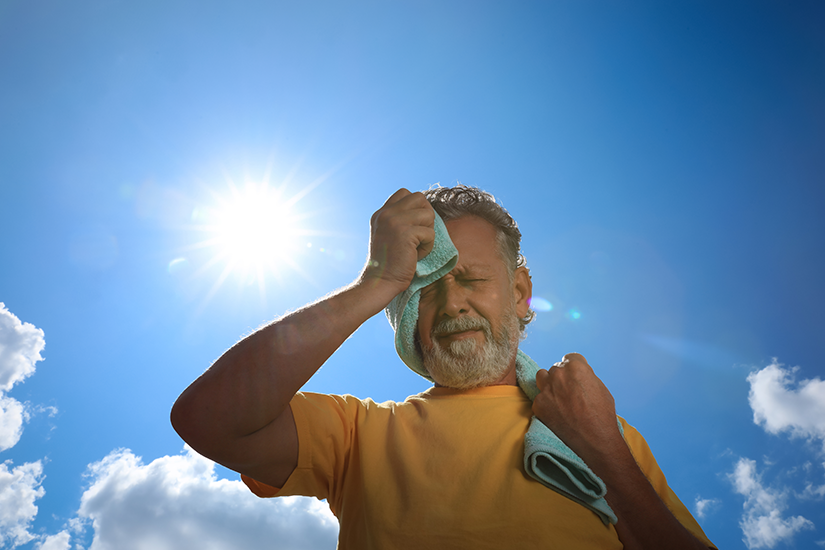- Emergency Ambulance Services
- 8606811111
- 0471-4077777, 0471-7177888
- gro@sutpattom.com
Seasonal Diseases in summer and their Prevention
Dr. Dhanya V Unnikrishnan, Consultant Physician, SUT Hospital, Pattom
Summer is a time to relax and have fun, but if you do not take precautions, you can easily catch seasonal diseases in summer. The rising temperatures can affect your skin, eyes, digestion, and entire body. During summer, common diseases include heat-related illnesses like heatstroke and dehydration, food poisoning from bacteria thriving in warm weather, sunburns, jaundice, red eyes etc.
Skin Issues: Heat Rashes and Sunburns
The medical name for heat rash is miliaria. It happens when sweat becomes trapped due to a blockage in sweat glands in the deeper layers of skin. Hot, humid weather, excessive sweating, tight or synthetic clothing, and certain medications can contribute to heat rash. People with overweight or obesity and people who sweat easily are more likely to get heat rash. Also, babies and children are more prone to it because their sweat glands are still developing. It manifests as small, red or flesh-toned bumps that can be itchy or prickly.
Sunburn is skin damage caused by excessive exposure to ultraviolet (UV) radiation from the sun. Prolonged exposure to the sun, especially during peak hours (10 a.m. to 4 p.m.), can lead to sunburn. Sunburn causes redness, pain, swelling, and sometimes blisters.
Prevention:
- Stay away from direct sunlight especially on hot sunny days.
- Use sunscreen daily.
- Use an mbrella and wear loose fitting cotton clothes while going out.
- Stay hydrated especially during afternoon hours and bathing twice a day is advisable.
- If symptoms are still persistent, it is advisable to consult a doctor.
Sunstroke
Sunstroke, also known as heatstroke, is a life-threatening condition where the body’s ability to regulate its temperature fails, leading to a rapid increase in core body temperature. This occurs when the body is exposed to excessive heat for extended periods, either through strenuous_activity in the sun or simply prolonged exposure to high temperatures. Symptoms include dizziness, fainting, blurred vision, slurred speech, confusion, headache, vomiting, body burns, and palpitation.
First Aid & Prevention:
- Relocate the person to a cool environment.
- To help with the ailments, ensure that the victim is hydrated with cold water which can help to bring down the body temperature.
- Restrict time in direct sunlight between the hours of 11:00 a.m. to 4:00p.m.
- Ensure to drink plenty of fluids and eat fruits.
- Get immediate medical help for further healthcare as soon as possible.
Waterborne Diseases: Diarrhoea, Jaundice, and Typhoid
Diarrhoea, jaundice, and typhoid are serious health issues, often linked to contaminated water and food. Diarrhoea is caused by bacterial or viral infections from contaminated food or water. Symptoms often include frequent loose or watery stools. Jaundice is caused by liver problems by certain infections like Hepatitis A&E. Symptoms yellowing of the skin and eyes. Typhoid is caused by the bacteria Salmonella Typhi. It also causes high fever, abdominal pain, and diarrhea or constipation.
Preventive Measures:
- Drink clean, boiled or filtered water.
- Avoid consuming food from unhygienic sources.
- Store food properly and eat freshly cooked meals.
- Get vaccinated to protect yourself from Typhoid and Hepatitis.
Viral Infections: Chickenpox, Measles, and Mumps
Chickenpox, measles, and mumps are highly contagious viral diseases, but preventable through vaccination. Chickenpox is caused by the varicella-zoster virus, measles by the measles virus, and mumps by the mumps virus. These are contagious and spread through direct contact or airborne means. Symptoms include fever along with red spots, blisters, headache, body ache and swollen salivary gland.
Preventive Measures:
- Get your MMR vaccine and chickenpox vaccine.
- Ensure you maintain proper hygiene, wear masks, and wash hands regularly.
- Seek a doctor’s advice when you notice symptoms.
- Eat easily digestible and nutritious food.
- Eye infection: Infections such as red eye and allergies
Allergies affecting the eye (allergic conjunctivitis) and red eye are more common during summer season. These infections spread through direct contact of eye with unwashed hands that came into contact with contaminated surfaces.
Preventive Measures:
- Wash your hands often and refrain it from coming into close contact with your eyes.
- Ensure you drink water and keep your eyes clean.
- Avoid touching or rubbing your eyes.
- Don’t share towels, makeup, or other personal items.
- Stay indoors during high pollen periods.
- Wear protective eyewear when necessary.
- Seek medical advice if symptoms persist or worsen.
General Summer Health tips:
- Remain in cooler rooms during peak heat hours.
- Protect yourself with an umbrella or a hat while going out.
- Wear loose and breathable cotton clothes.
- Eat fruits and vegetables and also ensure adequate water intake.
- Make sure you follow proper hygiene practices while preparing food at home and do your best to eat home-cooked food only.
- Clean your living space and the area around your home.
- Use water that has been boiled and cooled to avoid infections.









